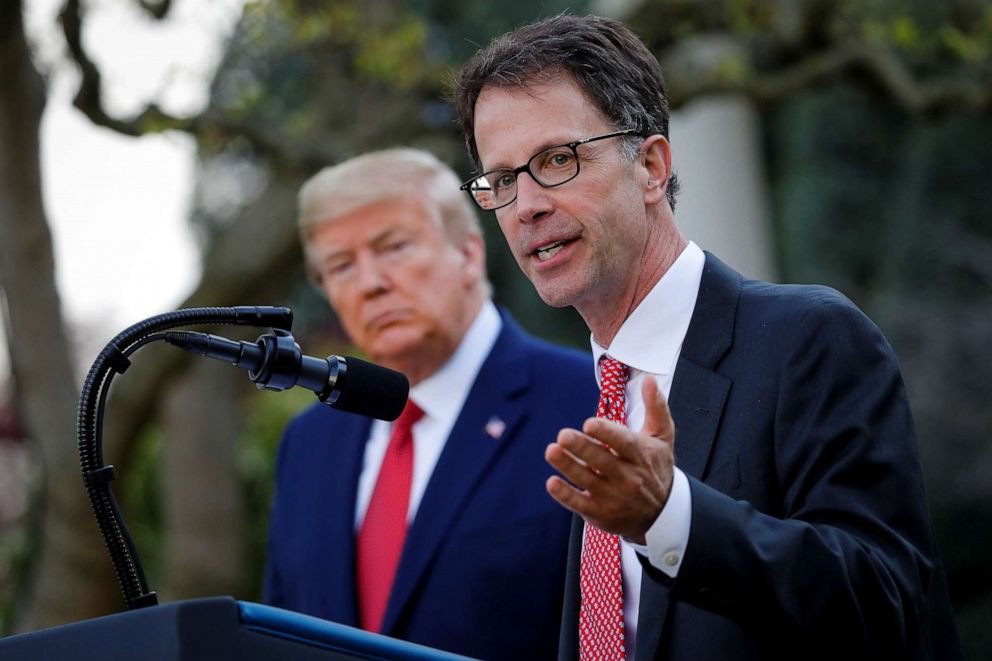'Little or no transparency': Warren wants data on White House medical supply program
Warren, Blumenthal ask suppliers for information about a White House program.
Two Senate Democrats are now probing 'Project Airbridge,' the Trump administration program aimed at getting medical supplies to hospitals amid the pandemic, warning the effort is too opaque.
While the White House has touted the Jared Kushner-backed program as an innovative public-private partnership designed to clear logistical logjams and bureaucratic red tape, Sen. Elizabeth Warren, D-Mass., and Sen. Richard Blumenthal, D-Conn., are worried that the administration is not doing enough to facilitate the supply of personal protective equipment to communities battling the coronavirus.
In letters sent on Monday to the six medical supply companies involved in the program, Warren and Blumenthal raised concerns about how the supply chain is being managed, given persistent shortages of protective equipment and other medical gear in hospitals across the country.
Tune into ABC at 1 p.m. ET and ABC News Live at 4 p.m. ET every weekday for special coverage of the novel coronavirus with the full ABC News team, including the latest news, context and analysis.
The calls in the Senate for more transparency echo similar demands in the House, where Rep. Ted Deutch, D-Fla., and others say they worry the industry-friendly program isn’t doing enough to ensure health care workers have the right equipment.
“We applaud and support efforts to quickly bring medical supplies to states, territories, and tribal nations who desperately need them, but we are concerned by the Trump Administration’s process for doing so, which appears to be—at least in part—driven by politics rather than public health, and delegates decisions about distribution to private companies with little to no transparency about how distribution and pricing decisions are made,” the senators wrote in their letters to the companies.
American taxpayers, Warren and Blumenthal wrote, “need an explanation for how these supplies are obtained, priced, and distributed through Project Air Bridge.”
“Unfortunately, neither the administration nor your company has explained critical details, such as the content of any existing contracts or financial agreements,” they wrote in their letters to Cardinal Health, Concordance Healthcare Solutions, Henry Schein, McKesson, Medline and Owens & Minor.
The Federal Emergency Management Agency has defended the program as necessary to reduce the amount of time for deliveries to hospitals without disrupting the supply chain.
“FEMA selected these companies because each of them have market penetration needed to rapidly deliver commercial medical supplies to the point of need,” the agency said in a statement provided last week to ABC News. “Their ability to supply their customer base was deemed critical to FEMA and (Health and Human Services) response efforts.”

Warren and Blumenthal's inquiry follows reports from ABC News and other outlets about the initiative.
After a March meeting at the White House, six of the country’s largest medical suppliers, together with FedEx and UPS, have worked with the Federal Emergency Management Agency to speed up the delivery of medical supplies from overseas to more quickly service coronavirus hot zones.
Under the terms of the partnership, the White House has picked up the tab for overseas flights, an average of $750,000 to $800,000, to bring the companies’ cargo to the United States faster than by cargo ship, according to FEMA.
The companies – which together make up 90% of the medical supply chain in the U.S. –pay for all of their supplies, and sell half of their cargo to customers and distributors in at-need counties identified by FEMA, according to the agency. (They are allowed to distribute the remainder of their inventory at their discretion.)
Warren and Blumenthal have asked the companies for details about their agreements with FEMA, how they are asked distribute their supplies in FEMA-designated “hot spots,” along with their plans and pricing for goods that enter their supply chain from Project Airbridge flights, among other information, by May 8.
FEMA has defended the program – and questions about the supply chain – from criticism, saying that the agency has been tracking final deliveries to hospitals, and doesn’t want to interfere with relationships between the suppliers and their customers.

The White House declined to comment.
Kushner, President Trump’s son-in-law and a White House senior adviser who has taken a leading role on several fronts of the administration’s coronavirus response, recently told reporters that the program “is an effort where the government is doing things that the government doesn’t normally do, where we are stretching.”
“We’re acting very quickly," Kushner said.
"I’m not here to disrupt a supply chain," Rear Adm. John Polowczyk, who is leading the supply chain task force for the Trump administration, told reporters at the White House earlier this month when asked about Project Airbridge.
But Democrats, in both the House and Senate, have argued that the entire supply chain needs more oversight and reform, given the accounts of PPE and equipment shortages that have emerged throughout the country since the first coronavirus outbreak in Washington.
While Warren and Blumenthal requested information from some of the private-sector participants in Project Airbridge, the White House has been expecting to face questions from Congress about the administration's coronavirus response efforts.
Warren, Blumenthal, and eight Senate Democratic colleagues have previously requested that the inspectors general of the Departments of Homeland Security and Health and Human Services investigate the distribution of personal protective equipment from the national stockpile, along with Project Airbridge.
A team of attorneys from the White House counsel's office, Vice President Mike Pence's office and federal agencies are preparing to address incoming requests, sources familiar with the matter previously told ABC News.
ABC's Kaitlyn Folmer and John Santucci contributed to this report.
What to know about coronavirus:
- How it started and how to protect yourself: coronavirus explained
- What to do if you have symptoms: coronavirus symptoms
- Tracking the spread in the US and Worldwide: coronavirus map




